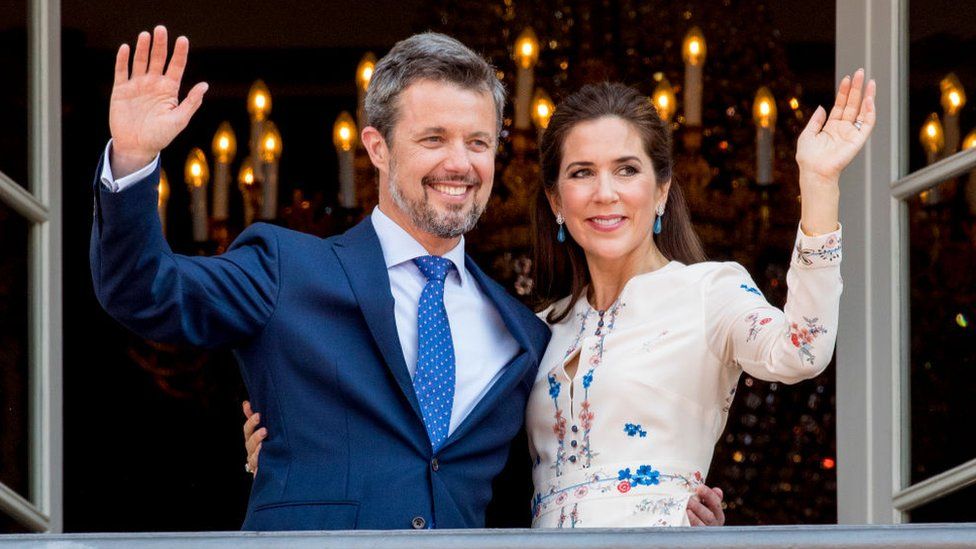Mary, Crown Princess of Denmark: Australia celebrates an unexpected queen
- Published

The crown princess is about to become the first Australian-born queen consort
When the world's last reigning queen announced her abdication, history was also made in a country far, far away.
"I will hand over the throne to my son Crown Prince Frederik," Queen Margrethe II of Denmark said.
Her decision to make way for "the next generation" of Danish royals has sent ripples around the world.
But it has also delivered the first Australian-born queen consort, Crown Prince Frederik's wife, Mary, Crown Princess of Denmark.
An unlikely meeting
Less than a month after Queen Margrethe II took over the throne in 1972 following the death of King Frederick IX, a girl called Mary Donaldson was born on the other side of the world in a small Hobart hospital.
The daughter of a mathematics professor and an executive assistant who had emigrated to Australia from Scotland, Mary grew up in a middle-class suburban home alongside her siblings, Jane, Patricia and John.
By most accounts she was a natural leader by the time she left high school - with her former principal telling the Australian Broadcasting Corporation (ABC), in 2003, that Mary was known as an "engaging, very outgoing, very amiable" young woman.
"She was a popular student and stood out from the crowd," an old teacher, Geoff Lockhart, told the Sydney Morning Herald.
After graduating with a degree in law and commerce from the University of Tasmania, she had a high-flying career in advertising and then luxury real estate.
But it was a chance encounter in a rowdy Sydney watering hole during the 2000 Olympic Games that would ultimately turn her life upside down.
Over a million Australians watched thecrown prince and princess's wedding live
As the story goes, a 28-year-old Mary had gone to the Slip Inn pub to meet some friends for a drink.
Several Europeans were among the group including Frederik, his brother, Prince Joachim, his cousin Prince Nikolaos of Greece and Denmark, Princess Martha of Norway, and the now King of Spain, Felipe VI.
There were no security details or prying paparazzi, and the fact that Mary and her friends were among royalty didn't come up in conversation.
Instead, the most serious topic of debate was whether men looked better with or without chest hair.
"Half an hour later someone came up to me and said, 'Do you know who these people are?'" Mary told the Australian comedian Andrew Denton in 2005, remembering the encounter.
"I gave Frederik my telephone number and he rang me the next day, so you could say something clicked. It wasn't fireworks in the sky or anything like that but there was a sense of excitement," she added.
They quickly struck up a long-distance relationship and, by 2002, Mary decided to relocate to Denmark where she started learning Danish and accepted a job at Microsoft.
When the couple tied the knot two years later in Copenhagen Cathedral on 14 May, more than a million Australians woke up in the middle of the night to watch the ceremony live.
Back in Tasmania, students from Taroona High School - Mary's alma mater - donned Viking helmets and tiaras for a celebratory royal supper.
"The Girl Who Charmed A Nation," was the front-page headline carried by the Copenhagen Post that day, alongside a news poll declaring that five out of six Danes were certain she would one day make a great queen.
The 'next generation'
For most of her reign, Queen Margrethe II has remained a popular figure in Denmark, and many expected her to keep the throne until death.
The longest-serving monarch in the nation's history, she is known for her brightly coloured clothing, love of archaeology and chain smoking.
Queen Margrethe II, pictured with her son and daughter-in-law, is the first Danish monarch to abdicate the throne since 1146
In recent years she oversaw a string of reforms aimed at "future-proofing" the age-old institution - which holds no jurisdictional authority but remains symbolically important.
Most notably, she slimmed down the number of royals and restructured palace finances so that only the heir to the throne receives a state-funded salary.
Now, it will be up to the crown prince and princess to shape the next chapter.
Celebrated for their modern values, the pair have tried to give their children as normal an upbringing as possible by sending them to mostly state schools.
They've also thrown their weight behind a range of issues.
The crown prince has made climate change his life's work, while the crown princess has gained recognition as an advocate for LGBTQI+ causes, maternal health and women's reproductive rights.
"I've always had a strong sense of justice: that everyone should have the same opportunities, no matter where you come from," she told the Financial Times in 2022.
As millions of Danes bid farewell to the only queen they've ever known, the transition of power - which is set to take place on 14 January - is likely to be a moment mixed with both sadness and celebration.
"It is my hope that the new king and queen will be met with the same trust and devotion which have fallen to my lot," Queen Margrethe II said in her abdication speech. "They deserve it. Denmark deserves it."
In Australia, though, the crown princess - despite renouncing her citizenship long ago - is already being celebrated as a national "ambassador".
"I look forward to watching the next generation [of royals] and Tasmania's own born queen lead Denmark's future," the state's Premier, Jeremy Rockliff, said in a statement.
"We are so proud."
- Published31 December 2023
- Published31 December 2023